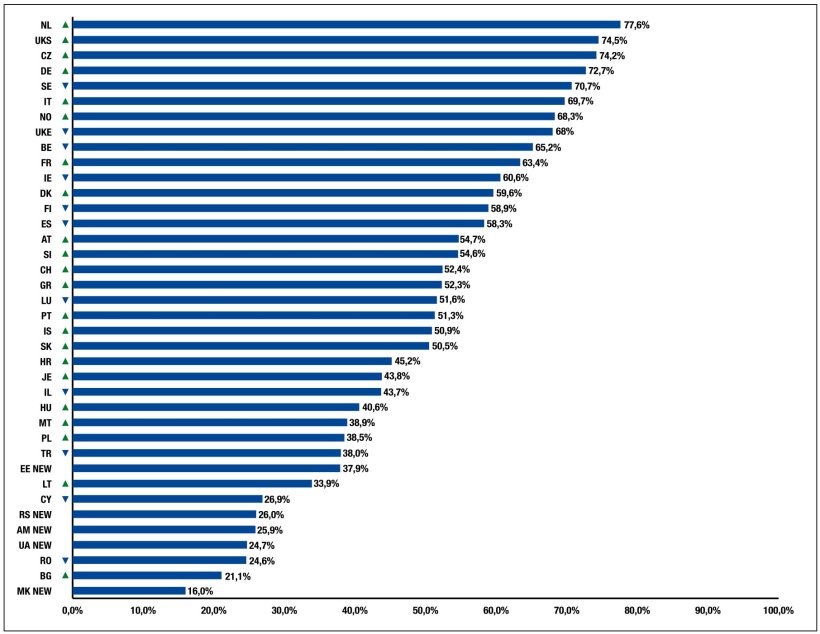
Image source: Adobe Stock/Eagle (EU flag and map); Adobe Stock/solvod (neurons); mashup: HiE
News • National policies benchmark
Dementia care and treatment: Continuing inequalities across Europe
In a new report, Alzheimer Europe highlights the continuing inequalities in access to dementia care and treatment across Europe.
The objective of the report entitled “European Dementia Monitor” was to provide a benchmark of national dementia policies in order to compare and rate the responses of European countries to the dementia challenge. The survey covered all Member States of the European Union (with the exception of Latvia), as well as Armenia, Iceland, Israel, Jersey, North Macedonia, Norway, Serbia, Switzerland, Turkey, United Kingdom (both England and Scotland) and Ukraine.
Jean Georges, Executive Director of Alzheimer Europe, the umbrella organisation of national Alzheimer associations with currently 42 member organisations in 37 European countries, stated: “Our organisation has consistently called upon European governments to recognise dementia as a national public health and research priority, and to develop national dementia strategies. The aim of the European Dementia Monitor is to assess which countries provide the most dementia-inclusive policies and guarantee the best support and treatment of people with dementia and their carers. This third edition of our report shows continuing inequalities between European countries, and we hope that national governments will use this report to improve the lives of people with dementia and their carers in those areas where they are currently lagging behind.”
The European Dementia Monitor compares countries on 10 different categories:
- The availability of care services
- The affordability of care services
- The reimbursement of medicines and other medical interventions
- The availability of clinical trials
- The involvement of the country in European dementia research initiatives
- The recognition of dementia as a policy and research priority
- The development of dementia-friendly initiatives
- The recognition of legal rights
- The ratification of International and European human rights treaties
- Care and employment rights

According to the findings of the European Dementia Monitor, no country excelled in all 10 categories and there were significant differences between European countries. Some of the key findings were:
- Luxembourg scored highest on care availability with most services rated as sufficiently available, whereas Norway scored highest on care affordability as it ensured that these services were accessible and affordable for people with dementia and their carers. On both care availability and care affordability, Bulgaria ranked last.
- On the availability and reimbursement of medical interventions, Sweden scored highest as all included medical interventions (with the exception of Fortasyn Connect) were covered by the national reimbursement system. Armenia ranked last in this category as none of the medical interventions were reimbursed.
- As Europe is waiting for the authorisation by the European Medicines Agency of new anti-amyloid treatments for Alzheimer’s disease, only Greece, Ireland, Slovakia, Sweden and the United Kingdom (England) had set up a working group or strategy to prepare for the introduction of these new treatments.
- France scored highest in the category of clinical trials as the only country where it was possible for people with dementia to take part in eight of the 10 phase III clinical trials which were studied for the report. The Netherlands, Spain and the United Kingdom came second, with seven clinical trials active in these countries. Armenia, Lithuania, Luxembourg, Malta and North Macedonia were on the other end of the scale, with no clinical trials available for people with dementia in those countries.
- France, Germany and the Netherlands were the countries that were the most active in European dementia research collaborations scoring 100% in that category, whereas Armenia, Cyprus, Greece, Iceland, Lithuania, Malta, North Macedonia, Serbia and Ukraine were not involved in the Joint Programme for Neurodegenerative Diseases Research (JPND) or any of the calls for European research collaboration.
- For recognition of dementia as a national policy and research priority, the United Kingdom (Scotland) came first with full marks whereas North Macedonia, Serbia and Ukraine did not score any points in this category.
- The United Kingdom (England and Scotland) had the most dementia-inclusive initiatives and communities, but Luxembourg, North Macedonia, Portugal and Serbia did not score any points in this category.
- Regarding the protection of the legal rights of people with dementia, a growing number of countries complied with Alzheimer Europe’s five recommendations in this field (Austria, Croatia, Czech Republic, Denmark, France, Germany, Iceland, Ireland, Israel, Italy, Jersey, Netherlands, Norway, Portugal, Slovenia, Spain, Sweden and the United Kingdom (England)). However, Bulgaria, North Macedonia, Poland and Romania scored no points in this category.
- In relation to International and European Human Rights Conventions, there has been progress since earlier editions of the Monitor (2017 and 2020), with an increasing number of countries (Cyprus, Czech Republic, Estonia, Finland, France, Greece and Portugal) having signed and ratified all of the treaties. Israel was the country with the least number of conventions signed and ratified.
- The Czech Republic, the Netherlands and the United Kingdom (Scotland) were the three countries where all care and employment rights were recognised, whereas Armenia, Cyprus and Ukraine came last in this category with none of these rights recognised in legislation.

© European Union 2022 - Source : EP; Photographer: Fred Marvaux
Deirdre Clune MEP (Ireland) welcomed the findings of the European Dementia Monitor: “As a Member of the European Parliament and as Vice-Chairperson of the European Alzheimer’s Alliance, I am interested in how European countries differ in their approaches to dementia care and treatment, and I hope that reports like this one can help identify good practices to be implemented in countries lagging behind. As an Irish MEP, I was happy to see that Ireland excelled in some key areas with the development of our national dementia strategy, the Irish Dementia Working Group and the recognition of legal rights. However, my country has some catching up to do in other areas, and more efforts need to be made to provide more accessible and affordable care services. Similarly, I would hope that more clinical trials will be conducted in Ireland to allow people with dementia to participate in research for the development of new and better treatments.”
On the basis of the findings in the 10 identified categories, Alzheimer Europe established a ranking of countries (with each category contributing 10% to the overall score), with the Netherlands coming first with an overall score of 77.6%, followed by the United Kingdom (Scotland) (74.5%), the Czech Republic (74.2%), Germany (72.7%) and Sweden (70.7%). Compared to the 2020 edition of the Dementia Monitor, the Netherlands and the Czech Republic improved their scores and ranking the most, moving up from seventh to first and from 19th place to third place respectively. The United Kingdom (Scotland) and Germany also slightly improved their scores, but Scotland stayed in second place while Germany moved from fifth to fourth place. Sweden moved down from first to fifth place in this year’s ranking, whereas the United Kingdom (England) and Belgium dropped out of the top five and moved to eighth and ninth place respectively.
It is time therefore that all European countries and in particular those in Eastern Europe recognise dementia as a national priority and develop national dementia strategies
Jean Georges
Gerjoke Wilmink, CEO of Alzheimer Nederland, welcomed the findings: “I was delighted to see that the Netherlands came first in this extensive survey of Alzheimer Europe. There has been a very strong commitment in my country to finding practical solutions and concrete support for the many people living with Alzheimer’s disease and other types of dementia. We are happy to continue sharing our experiences and good practices with our partner organisations within Alzheimer Europe, and look forward to learning from those countries in categories where the Netherlands did less well.”
Jean Georges, Executive Director of Alzheimer Europe, concluded: “It was great to see that a number of countries were able to improve the situation of people with dementia and their carers. However, as in our previous editions, we can see that progress is not the same across all European regions. Our Monitor shows that there is still a clear East/West divide in Europe with most of the Western and Northern European countries scoring significantly higher than Eastern European countries. As a rule, countries with national dementia strategies scored better. It is time therefore that all European countries and in particular those in Eastern Europe recognise dementia as a national priority and develop national dementia strategies.”
Source: Alzheimer Europe
06.12.2023






